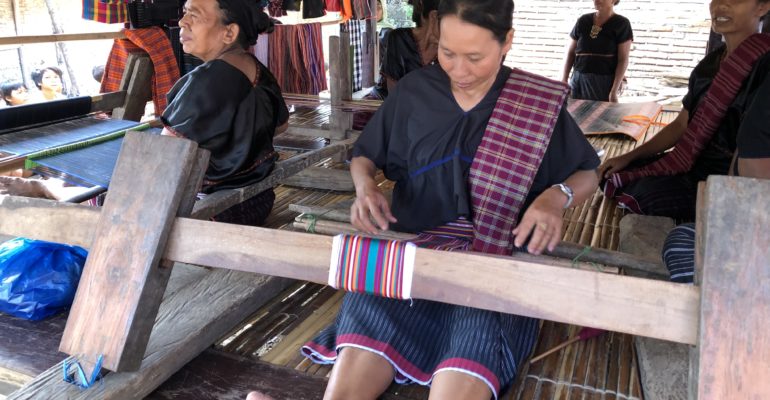Soroptimist clubs SI Jakarta and SI Kemang proposed projects for the SI President’s Appeal, ‘Women, Water & Leadership’ in Lombok and Palu respectively, and in March 2019, SI Jakarta commenced work in the Rebuk Satu village in Rembitan, Central Lombok – home to 31 families, approximately 124 people.
In mid-April a water well equipped with an electric pump was completed, with water flow sufficient for the villagers’ needs. Although unsuitable for drinking, the water will be safe for daily use. Testing is continuing, and once complete, water pipes will be installed to deliver the water from the well to the WASH areas around the village. Two 5,500 litre capacity water tanks have now been buried underground, mainly for safety reasons, so in the event of any further earthquakes, the tanks will not topple; covers for the tanks have now been designed.

Photo: Work taking place on one of the WASH blocks – a roof and the installation of toilets
The first WASH facilities – six toilets and one bathroom has now been built, and work has begun on a further four WASH ‘blocks’ each measuring approximately 5m x 6.5m and built on land donated by the villagers for this purpose. Work on the roof and the installation of toilets is now complete and the SI Jakarta Project team is carefully monitoring and checking all work carried out, making sure that everything meets standards in terms of quality, workmanship and time frames. Beside each of the new blocks a 1,500 litre tank will be installed 1.6 metres above ground level, so water can flow down easily due to gravitation. With no need for electric pumps, energy can be conserved, and electricity bills will be reduced for the villagers. Renovation is also planned for a local community centre, where vocational training programmes will be offered to villagers.

Photo: 25 experienced weavers are reviving, the traditional practice in the village of Lombok – creating beautiful brightly coloured wristbands
With the assistance of the Project’s part-time Empowerment and Capacity Development Officer, three community groups are now established in the Rebuk Satu village of Rembitan. These village groups, led by women, include a Water Committee; a Cleanliness Committee tasked with managing all aspects of cleanliness around the village, including hygiene and maintaining WASH facilities; and a Weaving Committee, with 25 experienced weavers, reviving, encouraging and training women in the traditional practice.
The capacity building component of the Project will also soon be underway. During initial stages, emphasis will be on developing community awareness programmes for which Working Groups, again led by village women, have already been formed. SI Jakarta members will volunteer their time to share their experience and expertise to train the villagers, particularly women, in areas such as health and hygiene; waste management and sanitation; and family nutrition. Additional awareness raising programmes will tackle issues such as the long-term negative impact of child marriage, and business skills including basic finance management. Experienced, local trainers will also be engaged to conduct a range of income generating programmes for the community.

